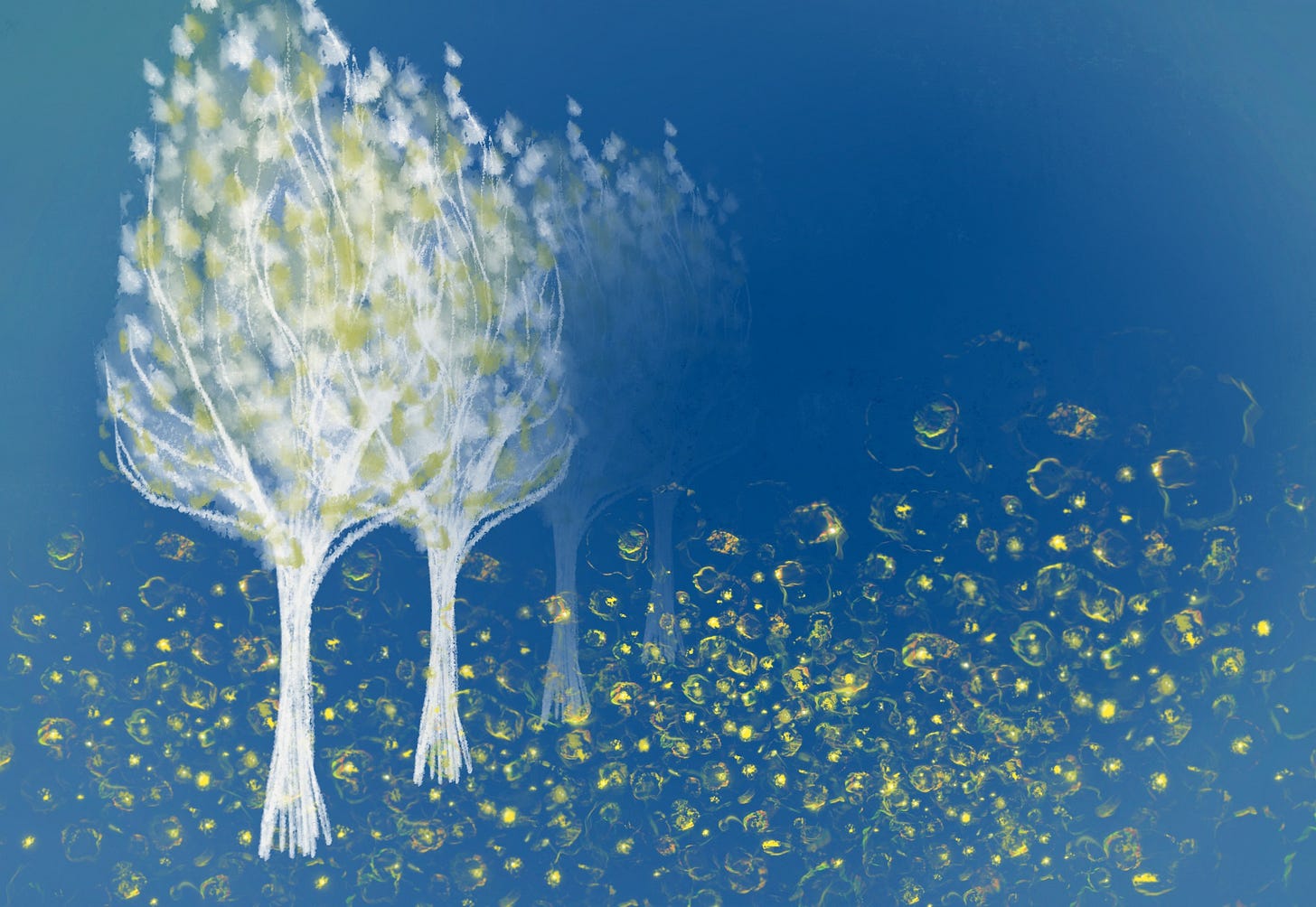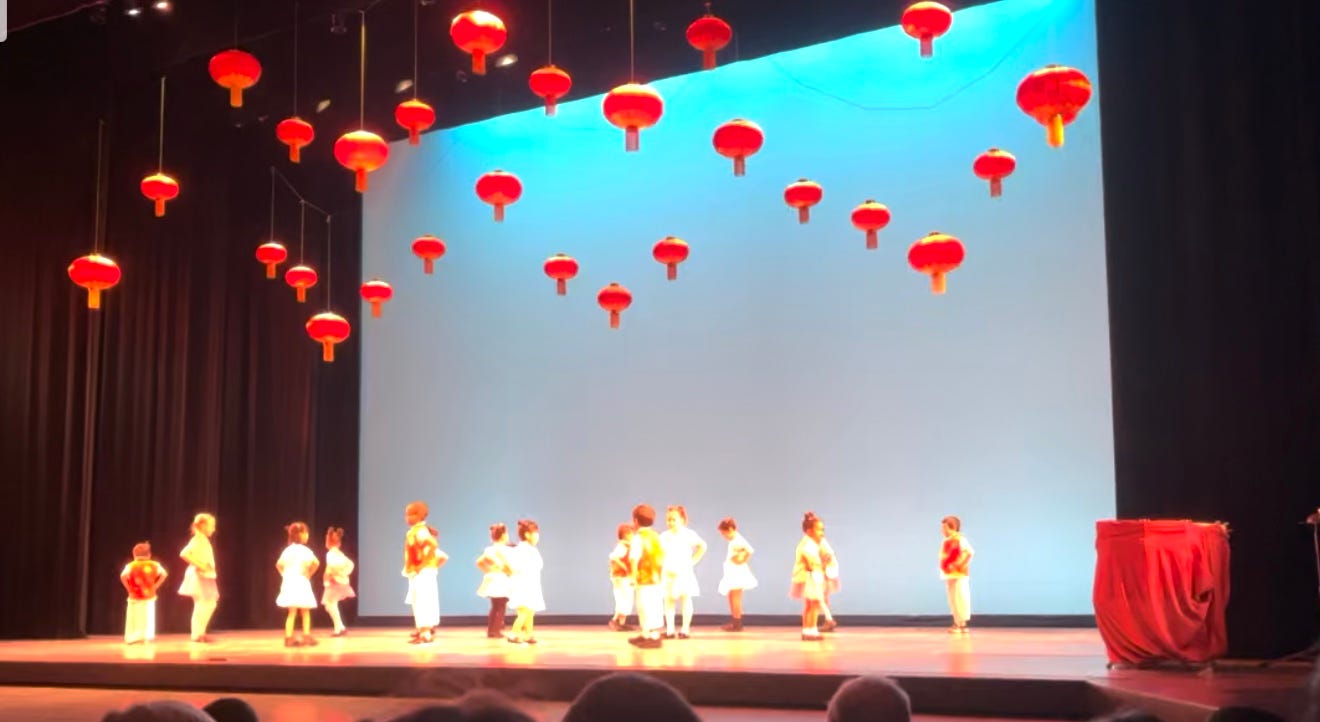Let It Be A Firefly, Let It Be A Bug
Week FIVE | For the Joy & the Sorrow | Look Outside, Look Inside
It’s been a busy week. If you read my Monday post, you know things are pretty chaotic in my life thanks to Trump’s shenanigans with regard to funding for research, and, on top of that, yesterday was particularly busy as we near the official opening of registration for WITD: THE CAMP (watch for application links to go live on Monday, as we anticipate it will fill pretty quickly; in the meantime you can read about CAMP here if you want to know more).
Finally, to cap off an already busy day, my granddaughter Brynley—who attends kindergarten at a wonderful Chinese immersion school here in the Twin Cities, was in her school’s lunar new year show last night. It was so wonderful, every minute. Wholly inspiring to see these kids, kindergarten through fifth grade, bring so much light and joy to the stage. So much skill, yes. But also so much open heartedness. I was in awe of them and felt hopeful just being in their presence. But, the show lasted an hour longer than I expected, so it was kind of late last night when I sat down to think about fireflies.
Yes, fireflies, the subject of essay #84 in Ross Gay’s Book of Delights, and also the subject of our attention this week in our For the Joy & the Sorry: Writing the World intensive (if you are not following along yet, you can join anytime, it’s asynchronous and you are never too late—and you can also join us in the daily chat if you like; it’s been source of humor, tenderness, and light these past few weeks!).
Before the fireflies, I have to reiterate how in awe I was of your essayettes last week, in response to Joy is Such a Human Madness. I have been reading them and will be sharing more comments still this week. The writing that is coming out of this intensive is sublime, and offers indisputable evidence that writing delight or joy is anything but treacly or shallow. When we write delight with an awareness of the brutality of the world, something quite astonishing occurs, and I am honored to witness it. I feel that the essayettes in this intensive are on par with the depth and complexity, the emotiveness and beauty, of Gay’s essayettes. I really, truly do.
I hope you are saving your snippets in a folder, maybe a folder called Delights, so that you can return to them later, to see if or how they might be doing what I call “talking to each other,” because I sense that some of your essayettes might very much like to stitch themselves together into something bigger, something more than the sum of its parts, eventually. Keep your eye on that, and your ears open, too.
This is how writing blooms, and how truth emerges.
As usual, we will look together at Gay’s essay, “Fireflies,” then do some writing in response to it. This essayette is super short, almost micro flash at about 300ish words, yet it packs a bittersweet punch. How is it that Gay pulls that off so frequently: bitter and sweet, hard and soft, happy and sad, beautiful and harsh, uplifting and heartbreaking, funny and tender, gorgeous and gross?
I don’t know for sure, because that’s not how art works, but I am coming to understand better, actually, how Gay achieves these incongruous impacts in his work. And for that, I am grateful. This deepening understanding is the direct result of our taking this time over these weeks to look closely at how Gay—in so few words!—captures opposing complexities without forcing the effect (it never feels artificial, like, “oh, here, I’ll put in something sad to balance the happy…”).
And I think this effect stems in large part simply from the way Gay walks in the world. He sees every single thing that is wounded and broken and dying and afraid, while also fully experiencing the astonishing miracle (yes, miracle; I am sorry, there really is no other word for it) of being alive right here, right now. What are the chances, what are the odds? How unlikely that any of us would have arrived on earth in the way we did at the time we did to become who we’ve become, to be alive right now, despite all our bodies have endured and all we’ve done to ourselves, too, to still be able to feel the warmth of winter sun on our cheeks, be licked on the face by our dogs, smell bread baking, know the weight and warmth of a child on our laps, see rain—rain!—falling from the sky to the earth, see snow,—snow!—which I don’t even like, but still, just think of the strangeness of it, the sublimeness of snow, falling in those impossibly uniquely individually gorgeous shapes, so meticulous and extraordinary from the sky? It’s bananas.
So, yes, I want to keep learning how Gay does what he does so that I can do it better and better myself.
With that in mind, let’s take a close look at “Fireflies,” then do some writing of our own.
I’ll start us of by saying that the main thing I noticed about the essay structurally is also what I think provides it’s basic integrity and emotional impact, and it’s the way Gay ultimately writes this this piece in two clear parts:
A close observation of something natural and not human (the firefly)
A memory of a meaningful personal experience (with his father)
This structure is similar to the one Mary Oliver uses in her famous poem “The Summer Day,” in which she opens with speculation about the world, the black bear, the grasshopper, and, only after bringing our attention straight into the palm of her hand to observe the grasshopper’s jaws moving “back and forth instead of up and down” does she turn her attention to herself and her own experience, when she interjects, “I don’t know exactly what a prayer is.” You can read “The Summer Day” here to see what I mean. You can also read more about the effects of and the brilliance of “The Summer Day,” and how it does what it does, here, at the Tuesday exercise called “Hand to the World” (Mary Oliver haters need not apply!).
For me, the most notable craft aspect of this essayette lives inside its approach of first looking outside, carefully and closely, then look inside (but, and this is key, while looking inside, also keep us in or close to the outside world, still, even in the personal, with concrete sensory details like, “your head into your father’s hip, which probably smelled of Cavatini or Mexican Pizza…”.
One other notable aspect worth pointing out is the way Ross uses grammatical






